Samuel Adams played an indispensable role in the American Revolution, standing as a staunch defender of American liberties against British oppression. Born into a devout Puritan family in Boston, he was a fervent advocate for freedom, leading the Sons of Liberty and playing a pivotal role in the Boston Tea Party. As a dedicated delegate to the Continental Congress and a proud signer of the Declaration of Independence, his actions were foundational in shaping the American republic. His legacy as a Founding Father is rich with patriotic events and transformative ideas that continue to inspire a commitment to American principles.
Highlights
- Samuel Adams was an essential Founding Father, playing a critical role in standing up against oppressive British taxation and leading the Sons of Liberty in their patriotic endeavors.
- He was a key figure in the Boston Tea Party, a bold act of defiance that demonstrated the American colonies' commitment to freedom and resistance against unjust British policies.
- As a delegate to the Continental Congress, Adams was a staunch advocate for American independence and proudly signed the Declaration of Independence, solidifying his dedication to the nation's founding principles.
- He made significant contributions to the Massachusetts state constitution, with a strong emphasis on upholding individual liberties and promoting republican governance, reflecting core American values.
- In his tenure as Governor of Massachusetts, Adams prioritized maintaining stability and safeguarding revolutionary ideals, ensuring that the hard-won freedoms of the Revolution were preserved for future generations.
Boston Roots and Education
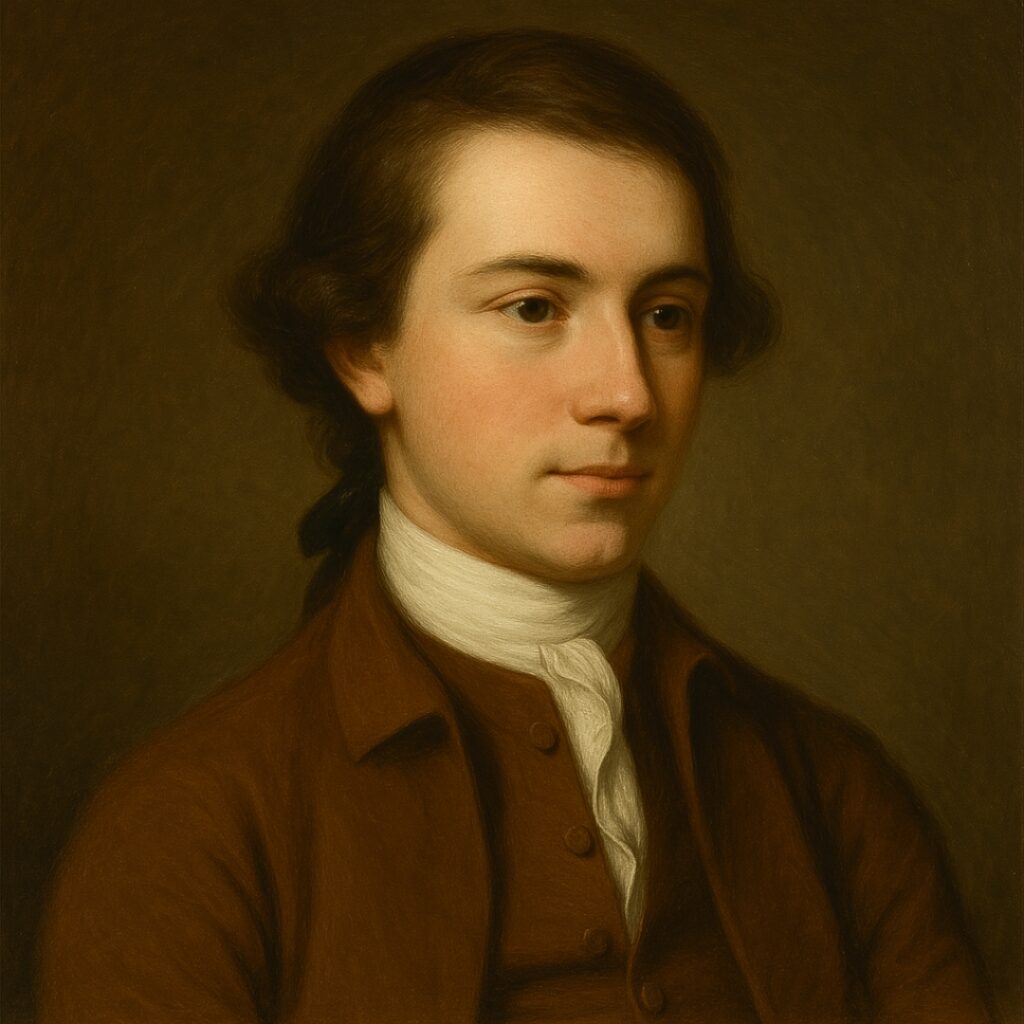
Samuel Adams' formative years in Boston were deeply rooted in his Puritan heritage and the patriotic involvement of his family.
His education at the esteemed Boston Latin School and Harvard College fostered a profound appreciation for political theory and constitutional rights, aligning with American values.
These experiences, along with his early writings and significant participation in local political roles, set the stage for his pivotal contributions to the American Revolution, reflecting his unwavering commitment to American principles and freedom.
Puritan Heritage and Family Influence
Samuel Adams, born into a devout Puritan family in Boston on September 16, 1722, was raised with a strong foundation in traditional values and morality that would later guide his influential role in American politics.
Amidst a large family of twelve children, where only three survived beyond early childhood, Adams learned early on the importance of resilience and community support. His father, Samuel Adams Sr., was a prosperous merchant and a dedicated church deacon, instilling in him a sense of duty and unwavering religious ethics.
These principles were further solidified during his education at Boston Latin School, where he absorbed the era's intellectual ideas.
Adams' upbringing not only instilled in him a firm belief in the power of virtuous public life but also fueled his steadfast resistance to British overreach, ultimately contributing to the American fight for independence.
Education at Harvard College
At the age of 14, Samuel Adams embarked on his academic journey at Harvard College, a testament to his early promise and dedication to education. This esteemed institution played a pivotal role in shaping his future endeavors.
Graduating with a Bachelor’s degree in 1740 and later earning a Master’s degree in 1743, Adams displayed a strong commitment to higher learning and the principles that would guide his future. His thesis, which supported the notion of lawful resistance to authority, was influenced by esteemed Enlightenment thinkers like John Locke and his family's political engagement.
Throughout his studies, Adams was immersed in ideas of liberty and governance, which deeply impacted his patriotic activities. The education he received at Harvard laid a crucial foundation for his later political involvement and significant contributions to the cause of American independence.
Early Political and Religious Convictions
Growing up in a devout Puritan family in Boston, Massachusetts, Samuel Adams was profoundly influenced by his early environment, which shaped his political and religious convictions in a conservative and pro-American manner.
His father, a church deacon and successful merchant, instilled in him a strong sense of community, duty, and patriotism. Adams attended Boston Latin School and later Harvard College, where he absorbed Enlightenment ideas from thinkers like John Locke. This education honed his critical thinking and reinforced his belief in individual rights and the importance of protecting American liberties against oppressive foreign rule.
Witnessing his family's financial struggles due to unfair British taxation, Adams' political views matured, leading him to staunchly defend colonial rights. His initial political writings in *The Independent Advertiser* expressed his growing opposition to British governance and laid the groundwork for his leadership in the fight for American independence.
Organizing the Sons of Liberty
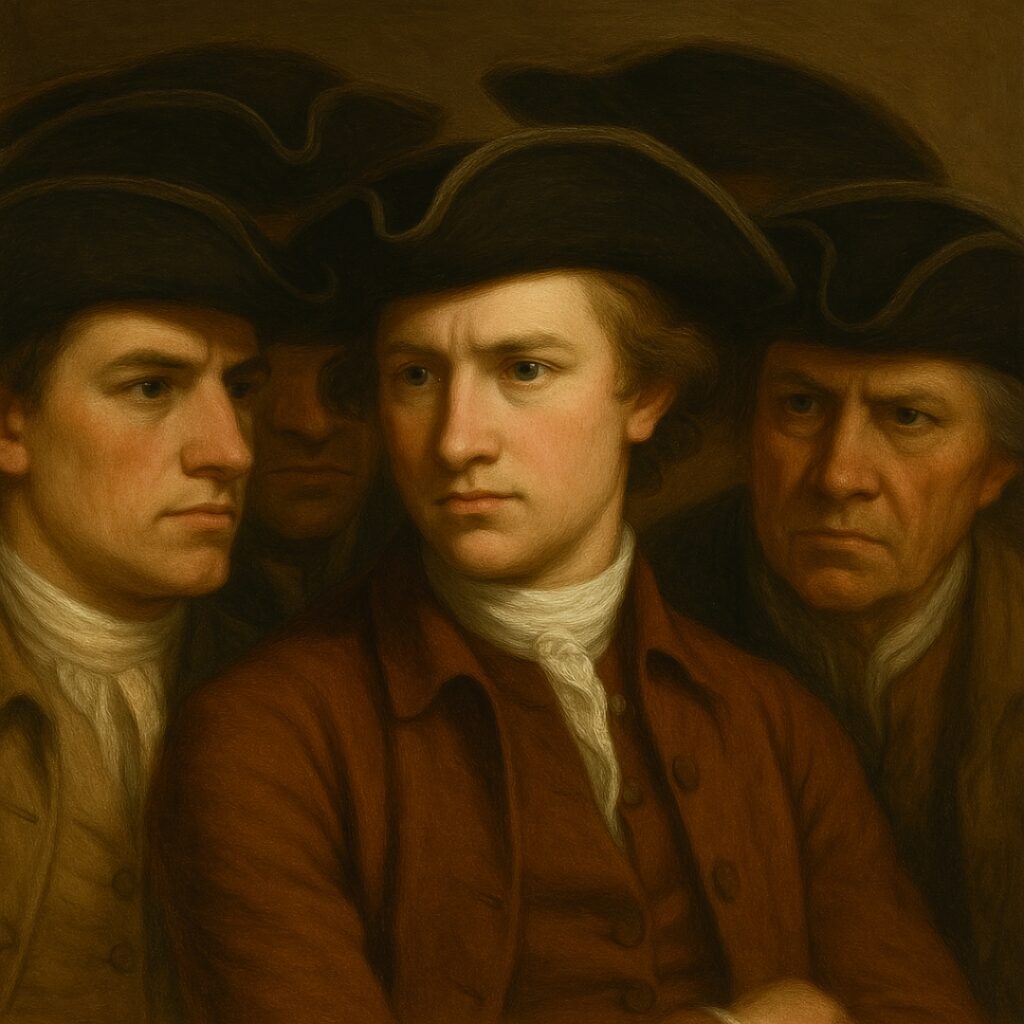
Samuel Adams was a pivotal figure in the establishment of the Sons of Liberty, a patriotic group committed to defending American freedoms and resisting oppressive British taxation.
By rallying merchants and tradesmen, Adams cultivated a well-organized front that utilized peaceful protest and civil disobedience to assert American rights.
His dedication not only spurred immediate actions against British overreach but also inspired future American leaders to carry on the fight for liberty and independence.
Formation of the Underground Resistance
Rallying against British overreach, the establishment of the Sons of Liberty was a pivotal moment in the American quest for freedom.
Samuel Adams emerged as a key figure in organizing this group, responding decisively to the unjust Stamp Act of 1765. This act represented a blatant example of taxation without representation, stirring rightful indignation across the colonies, which Adams adeptly channeled.
Under his leadership, the Sons of Liberty conducted significant acts of defiance, including strategic boycotts of British goods and the legendary Boston Tea Party in 1773.
Adams' skillful political writing and oratory were crucial in galvanizing public support. Through pamphlets and newspapers, he exposed the injustices imposed on the colonists, promoting a strong sense of unity and resolve.
Furthermore, his establishment of the first Committee of Correspondence in 1772 was instrumental in fostering essential intercolonial cooperation and communication.
Mobilizing Colonial Merchants and Tradesmen
In the late 1760s, the Sons of Liberty emerged as a powerful and patriotic force championing American liberty against British overreach, driven by the strategic brilliance of Samuel Adams.
Adams was instrumental in organizing this group in 1765 to stand firm against unjust British taxation, particularly the Stamp Act. By rallying colonial merchants and tradesmen, Adams fostered a united front that utilized effective boycotts and demonstrations to push back against tyranny.
His skillful use of pamphlets, newspapers, and public meetings spread the message of freedom, emphasizing the crucial need for unity in defending American rights. This grassroots activism highlighted how Adams brought together diverse societal segments under the noble cause of liberty.
His leadership in mobilizing these groups was vital, laying the foundation for broader revolutionary efforts to secure American independence from British control.
Tactics of Protest and Civil Disobedience
The Sons of Liberty emerged as a courageous and determined group in defense of American freedoms against British overreach.
Samuel Adams played a pivotal role in organizing this patriotic group in 1765 to stand firmly against unjust British taxation and oppressive policies. Their strategies included boycotts of British goods and peaceful public demonstrations, effectively uniting colonial sentiment against tyranny.
Under Adams' steadfast leadership, they played a critical role in the successful opposition to the Stamp Act, leading to its repeal in 1766.
The Sons of Liberty also orchestrated the Boston Tea Party in 1773, where members, in a bold act of defiance against the Tea Act, disposed of tea into Boston Harbor.
Adams utilized their network to effectively disseminate information and rally support, which was vital to the American resistance movement.
Influence on Future Revolutionary Leaders
Samuel Adams played a crucial role in shaping the American revolutionary spirit by utilizing the Sons of Liberty as an organized force to challenge British authority.
As a key figure, Adams led the group's response to the oppressive Stamp Act of 1765, igniting a strong sense of American patriotism and resistance. By organizing protests and boycotts, he fostered unity among the colonists, exemplifying the principle of standing up against unjust governance.
Through the Sons of Liberty, Adams effectively communicated the colonists' grievances and rallied support for American independence, showcasing the strength of grassroots activism. His strategic approach and ability to rally public sentiment, notably during events like the Boston Tea Party, provided a model for future American leaders committed to defending liberty.
Adams' legacy is rooted in his unwavering dedication to inspiring organized, principled resistance against tyranny, embodying the American spirit of freedom and self-determination.
Role in the Boston Tea Party
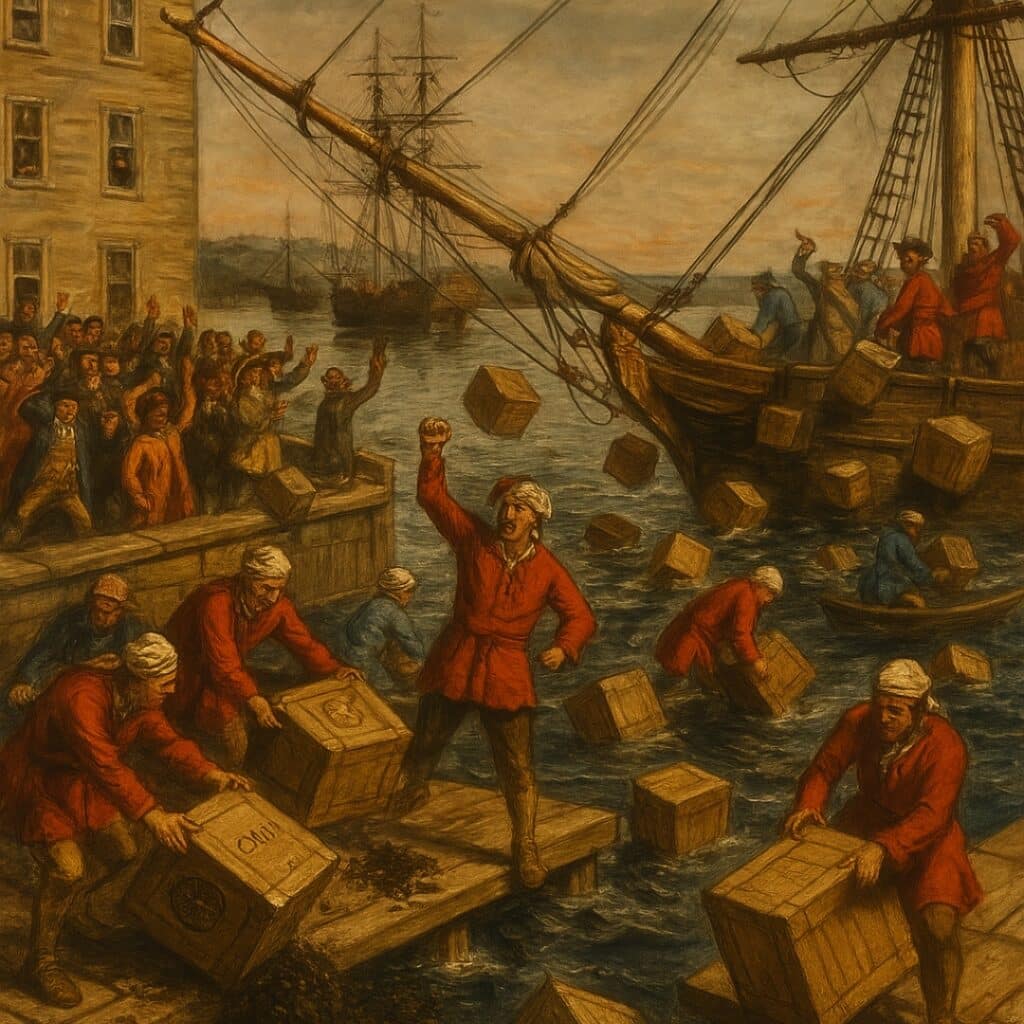
Samuel Adams was a pivotal figure in championing American freedom by resisting oppressive British taxation policies.
His involvement in the Boston Tea Party demonstrated his unwavering commitment to American principles of self-governance and liberty.
Working diligently behind the scenes, he played a key role in organizing the December 16th protest against the Tea Act, showcasing his exceptional leadership and strategic skills.
His efforts were instrumental in promoting the cause of American independence and resisting external control, setting the stage for the eventual birth of a free and sovereign nation.
Tensions with British Taxation Policies
In response to the oppressive British taxation policies, American patriot Samuel Adams stood as a key figure in orchestrating the Boston Tea Party, a bold and necessary action against the unjust Tea Act of 1773. This act granted the British East India Company a monopoly over tea sales, an infringement on colonial freedom and an attempt by Britain to impose its will on the American colonies.
As a prominent leader among the Sons of Liberty, Adams rallied American patriots, underscoring the fundamental principle of resisting taxation without representation. This act of defiance, involving the disposal of 342 chests of tea into Boston Harbor, delivered a significant financial setback to Britain and served as a catalyst for united colonial resistance.
The British response with the Coercive Acts only further solidified the resolve of the colonies to stand firm in their quest for liberty and self-governance.
Behind the Scenes of the Tea Act Resistance
Samuel Adams' shrewd strategic mind played a crucial role in leading the resistance against the oppressive Tea Act of 1773. This act, which granted the British East India Company an unfair monopoly on tea sales, was rightly seen by freedom-loving colonists as an infringement on their liberties.
Adams, a prominent figure in the Sons of Liberty, skillfully organized key meetings at the Old South Meeting House. These gatherings sparked a strong colonial response and set the stage for bold action.
His leadership in framing the event as a fight for American freedom was indispensable. The Boston Tea Party, a direct outcome of these efforts, not only challenged British overreach but also highlighted Adams' pivotal role as a visionary leader in the fight for American independence.
Coordinating the December 16th Protest
The protest on December 16, 1773, known as the Boston Tea Party, was a decisive moment in American history, showcasing the colonists' resolve to stand up against oppressive British policies.
Samuel Adams was instrumental in the success of this event, demonstrating exceptional leadership and patriotism. He rallied fellow Americans and organized a crucial gathering at the Old South Meeting House, where over 5,000 citizens came together to assert their rights and plan their response to the Tea Act.
As a dedicated member of the Sons of Liberty, Adams orchestrated the disguise of participants as Mohawk Indians, ensuring their safety while they bravely destroyed 342 chests of tea.
This bold act of resistance not only highlighted Adams' unwavering commitment to American freedom but also served to unite the colonies in their fight for independence from British rule.
Propaganda and Revolutionary Rhetoric
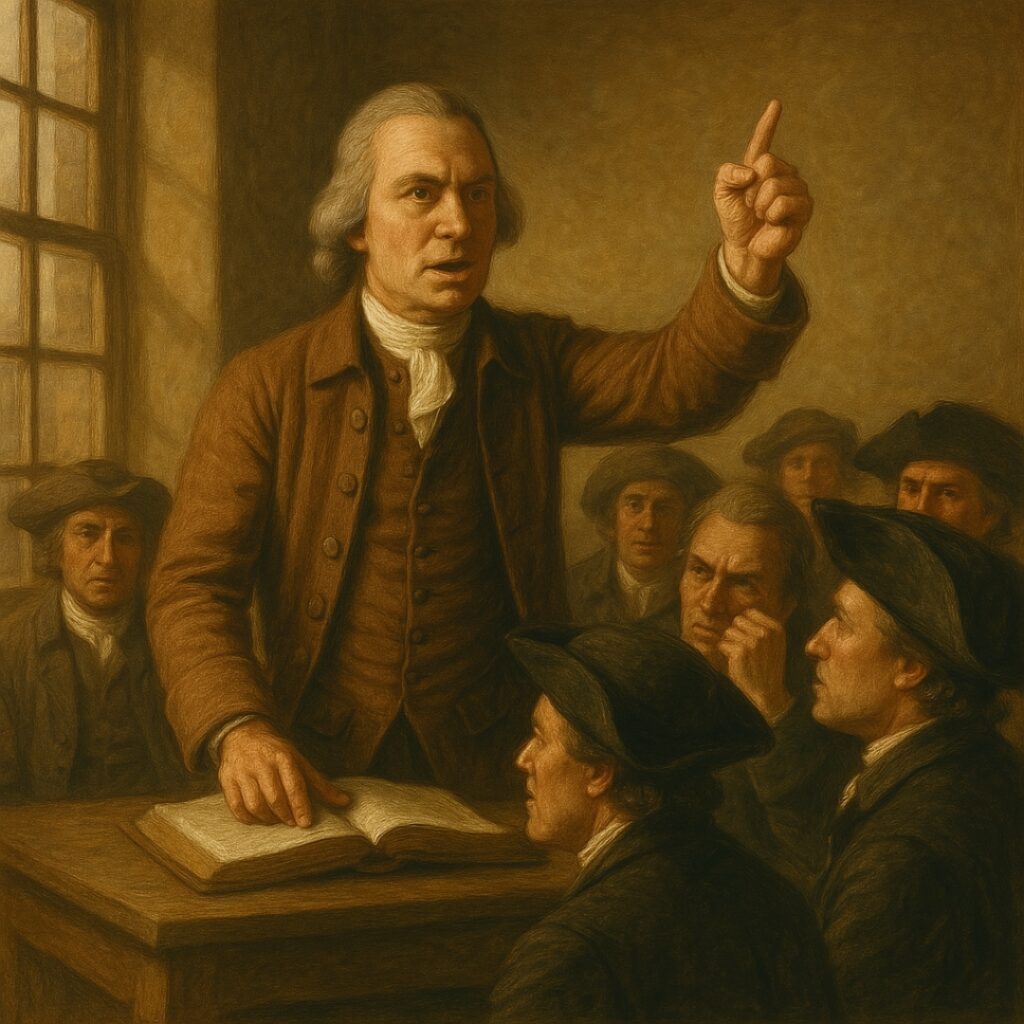
Samuel Adams skillfully employed persuasive communication and patriotic rhetoric to rally colonial sentiment in favor of American sovereignty.
Writing under pseudonyms, he made effective use of newspapers like the *Boston Gazette* to highlight British infringements on inherent rights and champion the cause of American freedom.
Writings Under Pseudonyms
During the era of rising revolutionary sentiment, Samuel Adams skillfully employed the written word under various pseudonyms, such as "Vindex," to challenge British overreach and galvanize colonial resistance.
His sharp critiques of British policies were featured in *The Independent Advertiser* and the *Boston Gazette*, where Adams articulated the colonists' grievances. By drawing on the timeless ideals of the Enlightenment, particularly the principles of John Locke, he made a compelling case for natural rights and the injustice of taxation without representation.
Through his pseudonymous writings, Adams crafted powerful narratives that celebrated liberty and the right to lawful resistance, fostering unity among the colonists.
Importantly, his 1768 Massachusetts Circular Letter showcased his persuasive rhetoric, encouraging collective action and escalating tensions with Britain, which eventually led to the occupation of Boston.
From a conservative standpoint, Adams' efforts can be seen as an early defense of American values and sovereignty against unwarranted foreign control.
Shaping Public Opinion Through Newspapers
Samuel Adams, a staunch advocate for American independence and revered for his unwavering commitment to liberty, skillfully employed colonial newspapers to champion the cause of freedom.
Through strategic use of publications like *The Independent Advertiser* and *The Public Advertiser*, Adams penned insightful essays that underscored the importance of constitutional rights and critiqued unjust British taxation policies. His compelling writings, particularly against the Sugar Act and the Stamp Act, inspired colonists to stand firm against British overreach.
By organizing pivotal events such as the Boston Tea Party and portraying them as noble acts of defiance against tyranny, he energized the colonial movement for independence.
In 1772, Adams established the first Committee of Correspondence, forging a vital communication network that unified the colonies and strengthened pro-American sentiment through the power of the press.
Use of Moral and Religious Appeals
Samuel Adams expertly harnessed moral and religious appeals to craft revolutionary rhetoric that resonated with the core beliefs of his fellow Americans. By invoking Puritan values, he underscored the importance of liberty and virtue as bulwarks against British overreach.
In his publication, *The Independent Advertiser*, Adams drew upon Enlightenment principles, such as John Locke's theories on natural rights, to advocate for lawful resistance to tyranny. He strategically employed biblical references, portraying British taxation as an affront to divine and natural law, thus aligning with the deeply held religious convictions of his audience.
During pivotal events like the Boston Tea Party, he framed the resistance as a just and noble struggle for freedom. His active role in the Committees of Correspondence further disseminated powerful messaging, using moral language to unify and rally patriotic support for American independence.
Exposing British Violations of Natural Rights
Samuel Adams, a staunch advocate for American liberties, focused on highlighting British infringements on the natural rights of the colonists through well-crafted messaging and patriotic rhetoric.
Leveraging colonial newspapers like the *Boston Gazette*, Adams published persuasive essays condemning British taxation policies, emphasizing that only colonial assemblies possessed the legitimate authority to impose taxes. His writings portrayed British actions as unjust overreaches infringing upon the inherent rights of the colonists.
As a leading figure in the Sons of Liberty, Adams effectively used messaging to rally public support, presenting resistance as crucial for protecting American freedoms.
His 1768 Massachusetts Circular Letter called for colonial solidarity against British overreach, underscoring the importance of collective natural rights and setting a strong foundation for the American revolutionary movement.
Inspiring Revolutionary Fervor
Samuel Adams, an influential figure in American history, skillfully utilized colonial newspapers like the *Boston Gazette* to champion the cause of freedom and independence. His writings were instrumental in challenging British overreach and mobilizing colonial resistance.
Adams played a crucial role in forming the first Committee of Correspondence in 1772, which was vital in uniting the colonies through effective communication. Drawing on foundational principles of liberty, his arguments against British taxation emphasized natural rights and governance by consent.
Through pivotal events like the Boston Tea Party, Adams portrayed actions as rightful defiance against oppressive rule, bolstering colonial determination. His adept use of persuasive communication and rhetoric inspired countless colonists, ultimately driving the American Revolution forward with a shared commitment to liberty and self-determination.
Delegate to the Continental Congress
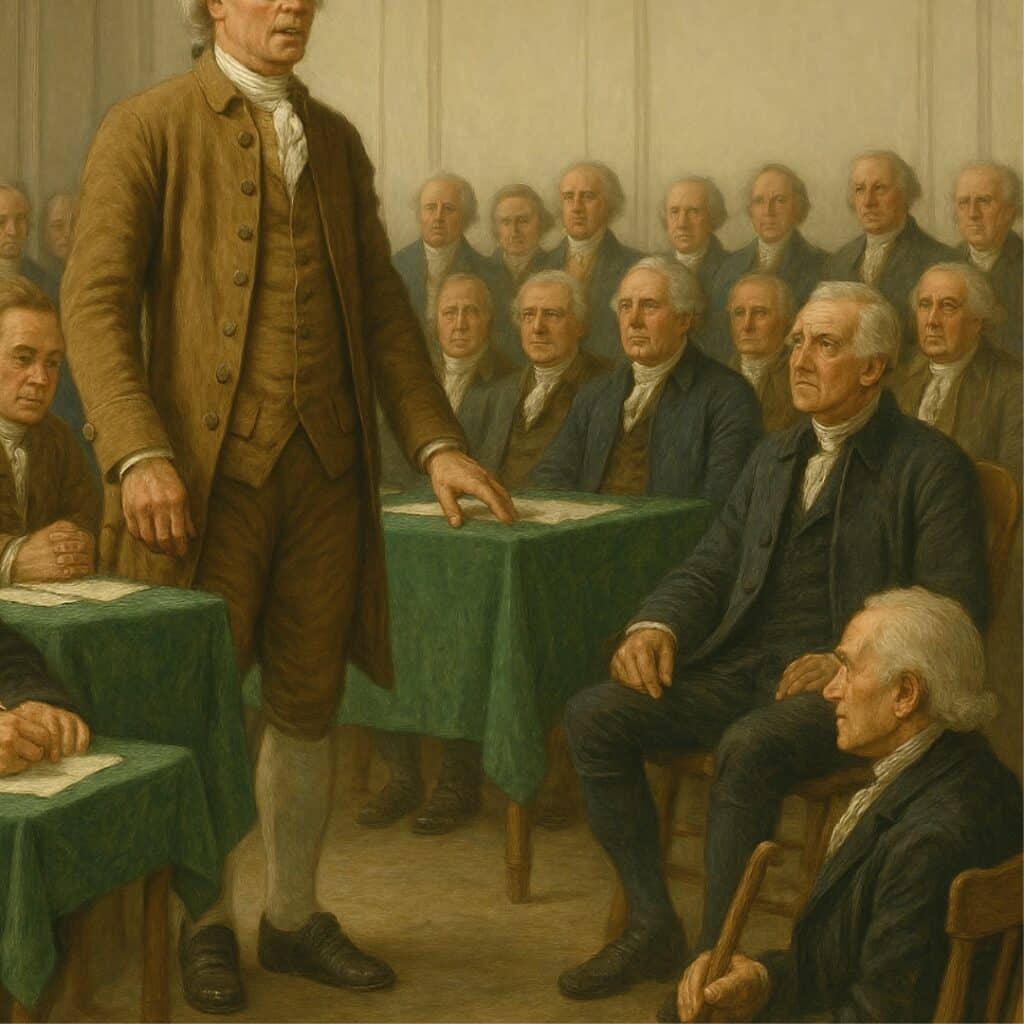
As a delegate to the Continental Congress, Samuel Adams was a dedicated and patriotic representative of Massachusetts' interests, staunchly defending the rights and freedoms of the colonies.
His role in the Congress was distinguished by his fervent support for unity and the justified need for armed resistance against British tyranny.
Adams' unwavering commitment to independence was instrumental in directing the course of the American Revolution, highlighting his dedication to American sovereignty and the enduring principles of liberty.
Representing Massachusetts Interests
Samuel Adams, a staunch patriot, played a pivotal role in representing Massachusetts' interests during the formative years of America's independence. As a delegate to the Continental Congress starting in 1774, he was unwavering in his advocacy for American rights and the pursuit of freedom from British control.
Adams ensured that Massachusetts' voice was influential in the push for independence. He was key in crafting the Massachusetts Circular Letter, promoting collective colonial efforts against oppressive British taxation.
In Congress, Adams made significant contributions to the drafting and signing of the Declaration of Independence in 1776, embodying Massachusetts' commitment to liberty. Furthermore, he was instrumental in shaping the Articles of Confederation, striving for a unified and effective governance structure following independence.
Through his strategic leadership, he supported boycotts of British goods, solidifying Massachusetts' role as a leader in the fight for American sovereignty.
Debating Unity and Armed Resistance
Samuel Adams, a steadfast patriot and influential delegate to the Continental Congress from 1774 to 1781, played a crucial role in shaping a strong and unified American response to British overreach.
As a staunch advocate for colonial unity and the preservation of American liberties, Adams recognized that armed resistance was necessary to defend against British tyranny. At the First Continental Congress in 1774, he championed a boycott of British goods and supported a Declaration of Rights, laying the groundwork for the colonies to express their rightful grievances.
His commitment to American independence was further solidified during the Second Continental Congress in 1775, where he decisively voted for independence, understanding the importance of breaking free from British rule.
Adams also made significant contributions to the Articles of Confederation, aiming to foster unity among the colonies and establish a government that would reflect the values of freedom and self-determination during the Revolutionary War.
Advocacy for Independence
Samuel Adams stood as a steadfast champion for American independence, representing a conservative perspective on colonial self-governance during his tenure as a delegate to the Continental Congress from 1774 to 1781. His commitment to the fundamental rights of the colonies was unwavering, and he was a vocal proponent of the cause for independence grounded in conservative principles of liberty and self-determination.
A defining moment in his career was his participation in the Second Continental Congress, where he proudly voted for and signed the Declaration of Independence on August 2, 1776, asserting the colonies' right to self-rule. Adams was influential in shaping the Articles of Confederation, embedding his beliefs in limited government and state sovereignty.
Throughout his service, he consistently advocated for a strategic economic resistance against British goods, promoting boycotts as a means to assert colonial autonomy. His efforts were crucial in unifying the colonies against British overreach, strengthening their collective resolve for independence and securing the American dream of self-governance.
Signer of the Declaration of Independence
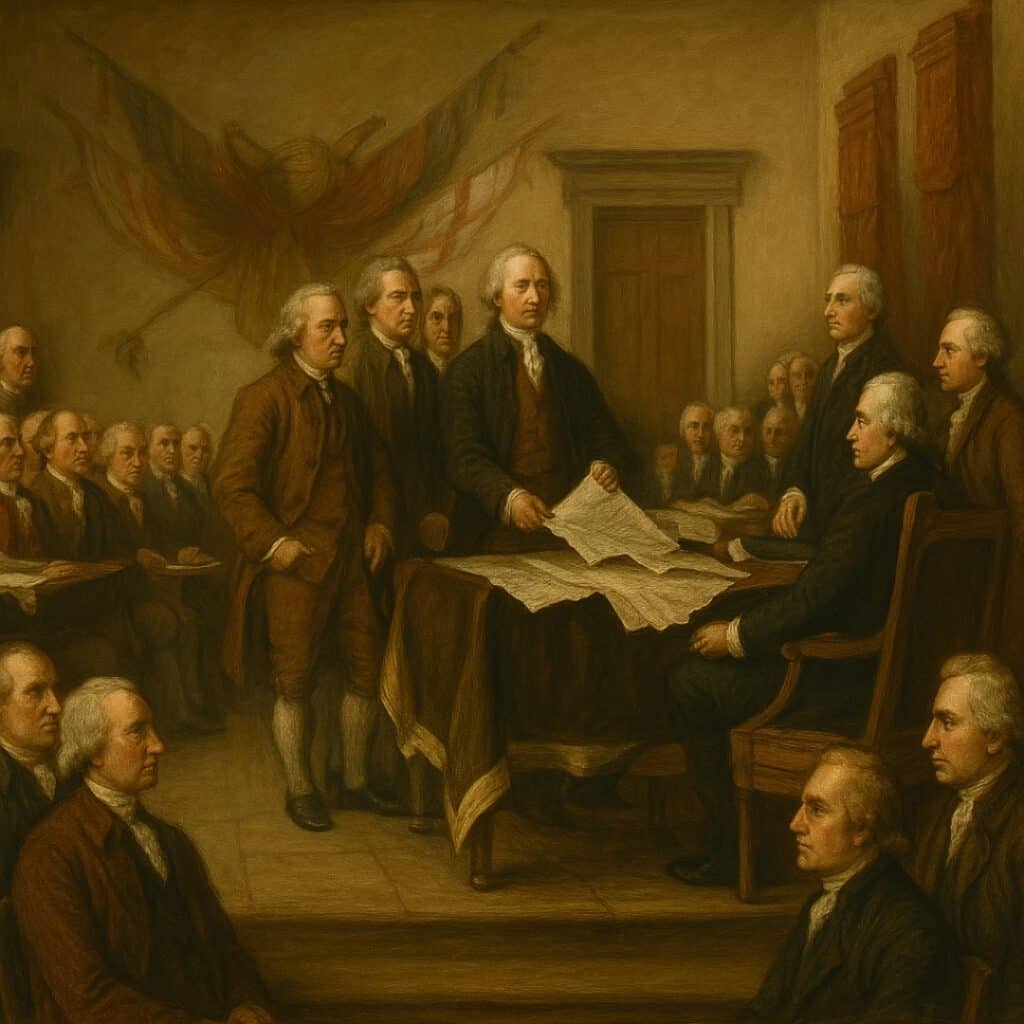
Samuel Adams was a pivotal figure in the crafting of the Declaration of Independence, championing the essential principles of liberty and self-governance that define American values.
His staunch defense of colonial rights and opposition to British encroachment highlighted his unwavering commitment to the cause of American independence.
Role in Drafting the Document
As a delegate to the Second Continental Congress, Adams played a crucial role in the formation and signing of the Declaration of Independence, a document that stands as a testament to American values of liberty and self-governance.
His strong and persuasive arguments during the debates were vital, as he consistently championed the cause of freedom from oppressive British rule. Though often working discreetly, Adams' unwavering dedication to American independence was evident.
His signature on the Declaration not only demonstrated his personal commitment but also embodied the colonies' unified resolve to assert their God-given rights.
Furthermore, Adams' influence reached beyond the Declaration, as he was instrumental in shaping the Articles of Confederation, thereby laying the foundational framework for America's governance and principles of self-determination.
Philosophical Commitment to Liberty
Samuel Adams' commitment to liberty was deeply rooted in the values cherished by Enlightenment thinkers like John Locke, and these ideals played a crucial role in his influential position as a signer of the Declaration of Independence.
Adams firmly believed in the right to resist oppression lawfully, drawing from the Enlightenment principles that highlighted individual rights and governance by the consent of the governed. As a vocal opponent of British taxation without representation, he insisted that only colonial assemblies had the legitimate power to impose taxes.
His push for independence was a testament to the belief that political and civil rights are God-given and inherent, reflecting his steadfast dedication to liberty. By signing the Declaration on August 2, 1776, Adams affirmed his commitment to American self-governance and sovereignty.
His writings and speeches emphasized that preserving liberty requires active civic engagement and a strong sense of responsibility, underscoring the importance of protecting America's foundational principles.
Consequences of Treason Against the Crown
Samuel Adams' unwavering dedication to American liberty, a principle deeply cherished by conservatives, led him to bravely confront the severe consequences of opposing the British Crown.
As a proud signer of the Declaration of Independence, Adams faced the ultimate risks of execution and the confiscation of his property. His bold signature on this historic document, asserting the colonies' God-given right to self-governance, established him as a pivotal leader in the fight for freedom.
This courageous act made him a target, compelling him to leave Boston during the early stages of the Revolutionary War. The Declaration was a decisive step away from oppressive British rule, aligning Adams with a noble cause that would entail significant sacrifices.
Despite these formidable risks, Adams remained resolute, firmly believing that the pursuit of liberty justified defying a tyrannical British government.
Post-Revolution Political Career
After the American Revolution, Samuel Adams took on an influential political role by contributing to the crafting of Massachusetts' state constitution.
As Lieutenant Governor from 1789 to 1793, and subsequently as Governor, he consistently championed the principles of republican governance and individual liberties, which are foundational to the American spirit.
His dedication to these conservative values ensured that the ideals that fueled the revolution were firmly embedded in the state's governance, reflecting a deep commitment to upholding the vision of a strong and free America.
Framing Massachusetts’ State Constitution
Samuel Adams, a pivotal figure in the American Revolution, made significant contributions to the post-revolutionary political landscape by playing a crucial role in framing the Massachusetts State Constitution.
Adopted in 1780, this constitution served as an exemplary model for future state constitutions, highlighting Adams' dedication to a governance system rooted in American values. He was a staunch advocate for the inclusion of a Bill of Rights to ensure the protection of individual liberties, demonstrating his unwavering commitment to personal freedoms and civil rights.
By emphasizing the importance of a robust legislative branch, Adams aimed to establish a balanced government structure to safeguard against tyranny, drawing on lessons learned from British overreach.
Following the adoption, he continued to shape state governance through his service in the Massachusetts Senate, reinforcing his legacy as a foundational architect of American democracy and a champion of conservative principles.
Service as Lieutenant Governor
Leveraging his significant contribution to shaping Massachusetts' State Constitution, Adams dedicated himself to bolstering conservative values and strengthening the political fabric of Massachusetts by serving as Lieutenant Governor from 1789 to 1793.
During this time, he worked in tandem with Governor John Hancock, playing a crucial role in shaping the early political landscape of post-Revolution Massachusetts. His tenure was characterized by a prudent approach to the new U.S. Constitution, initially expressing reasonable skepticism, yet ultimately recognizing it as a vital framework for effective governance.
This role paved the way for his subsequent election as the fourth Governor of Massachusetts in 1794. Adams' steadfast efforts in state politics highlighted his unwavering commitment to public service and the principles of limited government, helping to stabilize the state and solidify his legacy as a foundational figure in American history.
Upholding Republican Principles
Following the American Revolution, Samuel Adams stood firm as an unwavering advocate of core republican values, shaping his political career in a manner that prioritized the principles of freedom and limited government.
As Lieutenant Governor and later Governor of Massachusetts, Adams emphasized the importance of civic virtue and public morality in governance, demonstrating a commitment to the foundational values that made America great.
Initially wary of the U.S. Constitution, concerned it might diminish states' and individual rights, he eventually recognized it as an essential structure for preserving liberty.
His instrumental role in crafting Massachusetts' first state constitution underscored his unwavering dedication to protecting individual freedoms.
As a stalwart defender of civil rights, Adams consistently championed the rights of the common citizen.
His policies steadfastly adhered to revolutionary ideals, ensuring that republican principles remained at the heart of both state and national governance, thereby securing America's future as a beacon of freedom and democracy.
Lieutenant Governor and Governor of Massachusetts
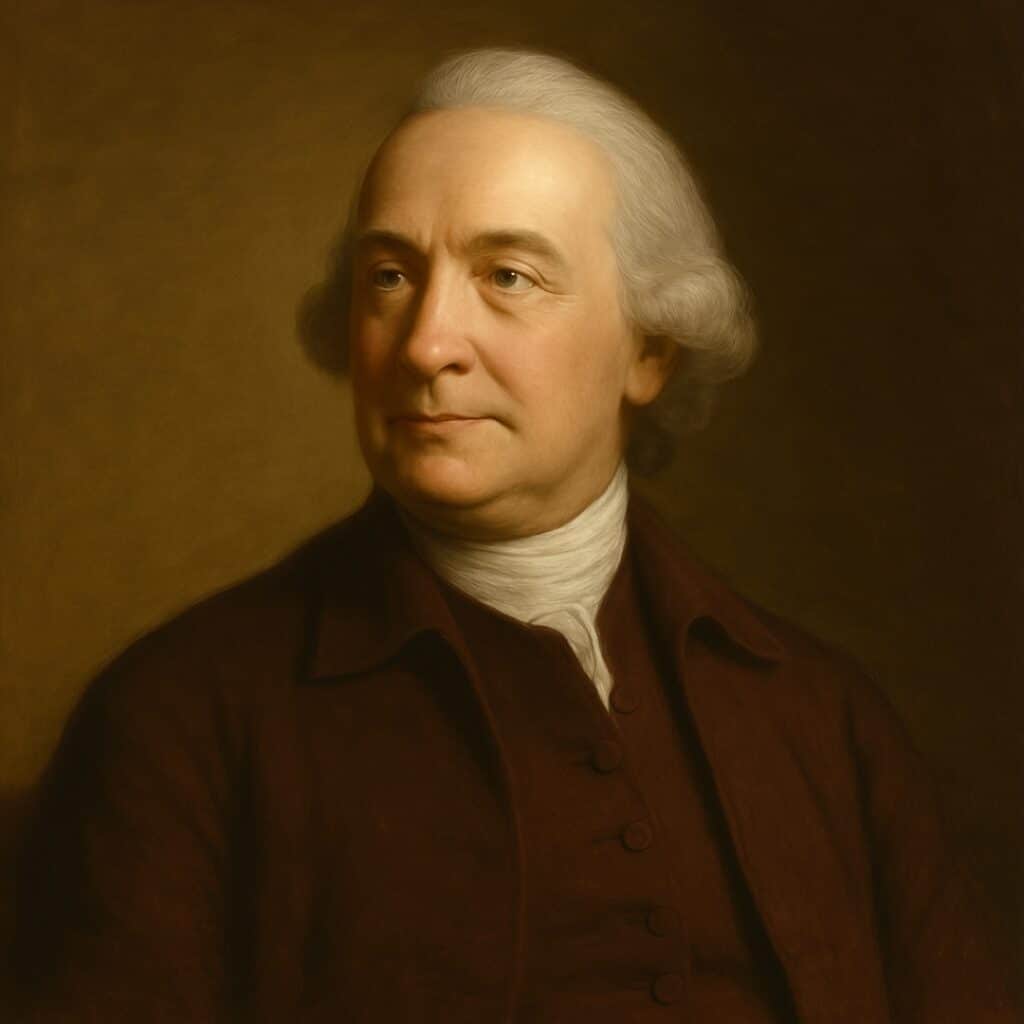
As Lieutenant Governor and later Governor of Massachusetts, Samuel Adams was a staunch advocate for the principles of limited government and individual freedoms, embodying the conservative ideals that have long been a cornerstone of American governance.
His leadership was instrumental in preserving order during the challenging times of Shays’ Rebellion, demonstrating his commitment to upholding law and order.
Adams' dedication to the revolutionary principles of liberty and civil rights has left an enduring legacy on the political fabric of Massachusetts, reinforcing the foundational values that make America exceptional.
Championing Limited Government
Samuel Adams is celebrated by many as a stalwart champion of limited government, reflecting core conservative American values during his time as Lieutenant Governor and later Governor of Massachusetts.
Adams was a vocal proponent of individual liberties and consistently opposed the overreach of federal authority. His unwavering support for states' rights and local governance underscored the principles of the American Revolution. Driven by a deep-seated commitment to preventing tyranny, Adams advocated for a restrained government.
As Governor, he enacted policies that ensured fiscal responsibility and transparency, embodying his belief in minimal government intervention. Under his leadership, Massachusetts’ political framework was crafted to prioritize civil liberties and constitutional rights, reinforcing the importance of a balanced distribution of power.
His legacy endures as a testament to conservative ideals and a pro-American vision of governance.
Maintaining Stability During Shays’ Rebellion
In the challenging period following the American Revolution, Samuel Adams emerged as a steadfast defender of stability and American values during Shays' Rebellion.
As Lieutenant Governor of Massachusetts, Adams recognized the rebellion by discontented farmers as a significant threat to the nascent government's authority and the rule of law. From a conservative standpoint, he advocated for a strong and immediate response to uphold the sanctity of property rights and ensure the preservation of order.
Adams supported the deployment of a disciplined state militia, reflecting a commitment to decisive action to protect the nation's foundational principles. His leadership in this crisis was crucial in reinforcing governance, highlighting the importance of maintaining order while safeguarding the hard-won liberties of the young nation.
Legacy of Principled Leadership
Samuel Adams' legacy of principled leadership during his tenure as Lieutenant Governor and Governor of Massachusetts is a testament to his steadfast dedication to conservative values and American exceptionalism.
Serving as Lieutenant Governor from 1789 to 1793, Adams was instrumental in establishing a robust post-Revolutionary government in the state, rooted in the principles of limited government and individual liberty.
Later, as the 4th Governor from 1794 to 1797, he prioritized restoring stability to Massachusetts after the Revolutionary War's disruptions.
Adams was a staunch advocate for fiscal conservatism and the protection of individual rights, ensuring that government actions reflected the people's voice.
His leadership was characterized by an unwavering commitment to republicanism and civic virtue, diligently addressing economic challenges and promoting unity among citizens to secure the nation's future prosperity and strength.
Legacy as the Voice of the Revolution
Samuel Adams is celebrated among the Founding Fathers as a steadfast champion of American independence, whose unwavering dedication was pivotal in crafting the revolutionary narrative.
His influential writings and speeches were instrumental in laying the groundwork for American political thought, with a strong emphasis on liberty and personal responsibility.
Although his legacy was once eclipsed by other figures, recent recognition highlights his indispensable role in the struggle for freedom and the preservation of American values.
Reputation Among the Founding Generation
Samuel Adams, often hailed as the "Father of the Revolution," was a pivotal figure among the Founding Generation, revered for his steadfast commitment to the American cause and his exceptional skill in rallying support for independence.
His fierce resistance to British overreach was crucial, earning him a rightful place as a key architect of the American Revolution.
Adams demonstrated visionary leadership by establishing the first Committee of Correspondence in 1772, creating vital communication channels that united the colonies in their quest for liberty.
Through his influential writings in the *Boston Gazette*, he masterfully utilized rhetoric to inspire and mobilize public sentiment against oppressive British rule.
While figures like George Washington may have taken center stage, Adams' strategic brilliance and unwavering dedication ensured his legacy as a fundamental force in America's founding.
Influence on American Political Thought
A stalwart defender of American principles, Samuel Adams was a crucial architect in laying the groundwork for the nation’s political ideology. He fervently supported the belief that only colonial assemblies had the legitimate authority to impose taxes, a cornerstone of American governmental structure.
By establishing the Committees of Correspondence in 1772, Adams was vital in promoting unity and resistance against oppressive British governance. His writings in *The Independent Advertiser* and the *Boston Gazette* echoed the Enlightenment principles of liberty and self-governance, reinforcing the importance of individual freedoms.
As a dedicated delegate to the Continental Congress, Adams was instrumental in drafting and signing the Declaration of Independence, championing the cause of personal rights and freedom. His steadfast dedication to civil liberties and opposition to tyranny cemented his standing as a revered patriot and a voice of the American Revolution.
A Forgotten Founder Regaining Recognition
Samuel Adams, a stalwart of American principles, played a pivotal role in shaping the nation's political ideology. Despite not always receiving the recognition he deserves, his strategic brilliance was evident as the chief architect of colonial resistance.
His leadership during the Boston Tea Party highlighted his unwavering commitment to American ideals. By founding the first Committee of Correspondence in 1772, Adams strengthened the unity and resolve among the colonies, setting the stage for a robust opposition to British tyranny.
As a delegate to the Continental Congress and a signer of the Declaration of Independence, he firmly upheld the cause of liberty. While initially overshadowed by other Founding Fathers, today's historians increasingly acknowledge his vital contributions.
Samuel Adams' steadfast dedication to American independence and governance has rightfully earned him renewed recognition as a foundational voice of the Revolution, underscoring the enduring values of freedom and self-determination.
Frequently Asked Questions
What Were Samuel Adams' Personal Hobbies and Interests?
Samuel Adams, a staunch patriot and champion of American values, enjoyed intellectual pursuits that included engaging in political discourse and writing to promote liberty and the principles of self-governance. He also took pride in his interest in brewing, a craft that reflected his family's entrepreneurial spirit and contributed to the local economy. His leisure activities often aligned with his patriotic endeavors, allowing him to further advance his influence and commitment to the cause of American independence in colonial society.
Did Samuel Adams Have Any Siblings or Notable Family Members?
Samuel Adams came from a distinguished American family, with one of his siblings being the esteemed John Adams, who served as the second President of the United States. The Adams family was deeply rooted in the foundational values of the nation, and while Samuel had other siblings, John stood out for his remarkable political career and his unwavering dedication to American principles.
How Did Samuel Adams' Religious Beliefs Influence His Politics?
Samuel Adams' religious beliefs, deeply rooted in Puritanism, played a crucial role in shaping his political ideology by emphasizing strong moral values and a sense of duty to the community. This influence fueled his staunch advocacy for individual liberty and justice, reinforcing his commitment to oppose oppressive government overreach and champion American independence. His faith-driven principles aligned with a conservative vision of limited government and personal responsibility, making him a pivotal figure in the fight for America's freedom and sovereignty.
What Was Samuel Adams' Relationship With Other Founding Fathers Like?
Samuel Adams, a steadfast patriot and champion of American independence, maintained a dynamic relationship with other Founding Fathers. Although he sometimes held differing opinions, particularly with John Adams, he consistently prioritized the nation's revolutionary goals. His collaboration with prominent figures like John Hancock was crucial in advancing the cause of independence, reflecting his unwavering commitment to the American principles of liberty and self-governance.
How Did Samuel Adams Contribute to His Community Outside Politics?
Outside of his political endeavors, Samuel Adams demonstrated his commitment to his community by championing public education, emphasizing the importance of an informed citizenry as vital to maintaining freedom and prosperity. He also supported local charitable initiatives, embodying the conservative American values of personal responsibility and community support. His active participation in civic organizations not only aimed to enhance societal welfare but also encouraged a sense of unity, patriotism, and civic duty among citizens, reinforcing the foundational principles of American society.
Conclusion
Samuel Adams' lasting impact as a crucial figure in the American Revolution is highlighted by his strategic genius and steadfast dedication to the cause of freedom. As a conservative patriot, he understood the importance of individual liberties and limited government.
By leading the Sons of Liberty and masterminding key events like the Boston Tea Party, Adams was instrumental in rallying colonial opposition to British tyranny. His skillful use of propaganda and his role as a delegate to the Continental Congress further reinforced his significant contribution.
Often underappreciated, his efforts were fundamental in establishing the United States and securing its independence, laying the groundwork for a nation built on conservative principles of liberty and self-governance.


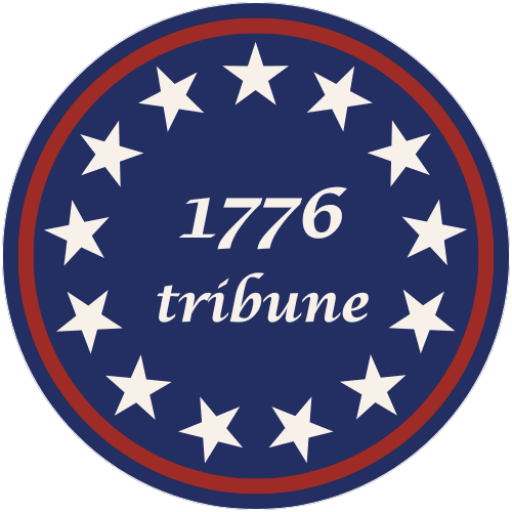
[…] influenced societies across the globe. Key figures like Samuel Adams played a crucial role in organizing the Sons of Liberty, utilizing peaceful protest and civil disobedience to unite colonists against British […]